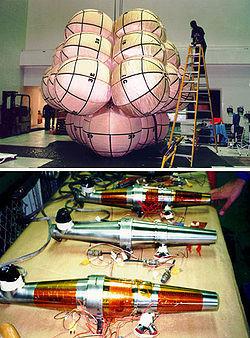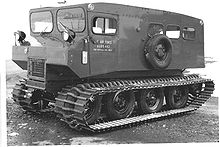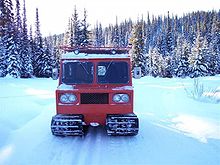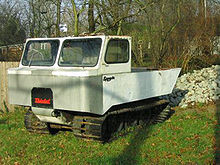- Thiokol
-
Thiokol Chemical Corporation Industry Aerospace, Manufacturing, Chemicals Fate Purchased by ATK Launch Systems Group Founded December 5, 1929 Defunct 2007 Headquarters Ogden, Utah, USA Products Rocket engines Employees 15,000 Parent Cordant Technologies Thiokol (variously Thiokol Chemical Corporation, Morton-Thiokol Inc., Cordant Technologies Inc., Thiokol Propulsion, AIC Group, ATK Thiokol; currently ATK Launch Systems Group) is a U.S. corporation concerned initially with rubber and related chemicals, and later with rocket and missile propulsion systems. Its name is a portmanteau of the Greek words for sulfur (Θειο "theio") and glue (κολλα "kolla"), an allusion to the company's initial product.
The Thiokol Chemical Company was founded in 1929. Its initial business was a range of synthetic rubber and polymer sealants, and Thiokol was a major supplier of liquid polymer sealants during World War II. When scientists at the Jet Propulsion Laboratory discovered that Thiokol's polymers made ideal rocket fuels, Thiokol moved into the new field, opening laboratories at Elkton, Maryland, and later production facilities at Elkton and at Redstone Arsenal in Huntsville, Alabama. Huntsville produced the XM33 Pollux, TX-18 Falcon, and TX-135 Nike-Zeus systems. It closed in 1996. In the mid 1950s the company bought extensive lands in Utah for its rocket test range, and continues to have major operations in the state, at Magna and Promontory (home of the Space Shuttle's SRB), and its current headquarters at Brigham City. As of 2005[update] the company employed over 15,000 people worldwide and records annual sales of around $ 840 million.
Contents
Company history
- 1926: Two chemists, Joseph C. Patrick and Nathan Mnookin, were trying to invent an inexpensive antifreeze. In the course of an experiment involving ethylene dichloride and sodium polysulfide, they created a gum whose outstanding characteristic was a terrible odor. The substance clogged a sink in the laboratory, and none of the solvents used to remove it were successful. Then the frustrated chemists realized that the resistance of the material to any kind of solvent was a useful property. They had invented a synthetic rubber, which they christened "Thiokol."[1]
- 1929: Thiokol Chemical Company founded.
- 1945: Charles Bartley, working for the nascent Jet Propulsion Laboratory, discovers the use of thiokol as a stabilizer in solid-fuel rockets.[2]
- 1949: Thiokol produce the TX-18 Falcon missile, the world's first solid-fueled missile system.
- 1957: In anticipation of the forthcoming Minuteman contract, the company builds its plant at Brigham City, Utah.
- 1957: Thiokol Huntsville builds XM33 Pollux missile
- 1958: Merger with Reaction Motors Inc. (RMI), makers of liquid propellant rocket motor systems.
- 1958: Thiokol awarded contract to build the TU-122 rocket motor for the first stage of the LGM-30 Minuteman ICBM system.
- 1959: Thiokol Huntsville produces CASTOR strap-on booster rocket, used on the Atlas rocket.
- 1964: Woodbine, Georgia plant is constructed to build solid propellant motors for NASA, but the agency changes course and uses liquid fuel.[3]
- 1969: Thiokol awarded Army contract to manufacture 750,000 Tripflares for Vietnam.[3]
- 1971: Explosion in magnesium flare assembly facility at Woodbine plant kills 29 and injures 50.[3]
- 1974: Thiokol wins the contract to build the solid rocket booster (SRB) for the Space Shuttle (Nov 29, 1973)
- 1978: The company sells its ski lift division to CTEC and its snow equipment division to Logan Manufacturing Company (LMC), owned by John DeLorean.
- 1980: Acquires Carlisle Chemical Company of Cincinnati, Ohio.
- 1982: Thiokol merges with Morton-Norwich products (owners of the Morton Salt concern, the Simoniz automotive products brand, and various chemical concerns). The merged company is called Morton Thiokol Incorporated (MTI).
- 1986: An O-ring fault in an MTI SRB destroys Space Shuttle Challenger in flight. The company is found at fault for the destruction of the Challenger and deaths of the astronauts. (see Space Shuttle Challenger disaster).
- 1989: Morton Thiokol splits, with most of the chemical concern going with Morton. The propulsion systems division becomes Thiokol Inc.
- 1998: Thiokol changes name to Cordant Technologies.
- 1998: Thiokol branded polymer products purchased by PolySpec L.P., a Houston-based manufacturer of industrial coatings, marine decking, and subsea insulation products.
- 2000: Thiokol merges with two divisions of Alcoa and with Howmet Castings and Huck Fasteners to become AIC Group (Alcoa Industrial Components).
- 2001: Alliant Techsystems (ATK) Inc. (a company formed when Honeywell spun off its defense division) spends $2.9 billion buying Thiokol and related businesses from AIC/Alcoa. ATK built the third stage of the Trident missile and had earlier bought Hercules Aerospace Co., builder of the second stage. With the purchase of Thiokol, who make the missile's first stage, ATK controls the lion's share of the US solid rocket-fuel market.
- 2005, Thiokol wins the contract to produce the Ares I launch vehicle first stage for NASA's Project Constellation.[4]
- 2006, Alliant Techsystems (ATK) Inc. renamed ATK-Thiokol to ATK Launch Systems Group.
Products
 Thiokol gas generators were used in the airbags on Mars Pathfinder. The top photo shows a complete airbag assembly under test, the bottom shows the three titanium Thiokol gas generators used to inflate the airbags.
Thiokol gas generators were used in the airbags on Mars Pathfinder. The top photo shows a complete airbag assembly under test, the bottom shows the three titanium Thiokol gas generators used to inflate the airbags.
Products made by the aerospace divisions of RMI and Thiokol include motors used in Subroc, the Pershing missile, the Peacekeeper missile, Poseidon missile, Minuteman missile, and the Trident I and Trident II missiles. Thiokol produces powerplants for numerous U.S. military missile systems, including AIM-9 Sidewinder, AGM-88 HARM, AGM-65 Maverick, AGM-69 SRAM, and AIR-2 Genie.
Thiokol also produced a variety of liquid and solid rocket motors for the US space program, including deorbit motors for the Mercury and Gemini programs, rocket stages and separation rocket motors for the Apollo program, motors for the Pioneer, Surveyor, Viking, Voyager, and Magellan missions, updated CASTOR boosters for the Delta rocket, and the Space Shuttle Solid Rocket Booster. Reaction Motors powerplants propelled the X-1 and X-15 aircraft, and later Thiokol technologies were also used in the private Tier One manned spaceplane. On March 1, 2006, NASA announced that Thiokol will be the prime contractor for the new Crew Launch Vehicle (CLV), to be known as the Ares I, which will put the Orion spacecraft (formerly known as the "Crew Exploration Vehicle") into low earth orbit, along with the five-segment SRBs for the heavy-lift Cargo Launch Vehicle (CaLV), known as the Ares V.
In addition to ski lifts, Thiokol produced a range of equipment for ski resorts including snowcats and snow grooming vehicles. These businesses were spun off in 1978 when the company restructured itself to concentrate on its rocket products and related technologies. John Z. DeLorean purchased the Thiokol snowcat operation and renamed it DMC. DMC continued to manufacture snowcats until 1988, when the company was renamed LMC. LMC continued making snowcats for 12 more years but ceased operations in 2000. Thiokol produced snow vehicles with a wide range of capabilities and duties. They company also produced several utility based vehicles based on their snowcat tracked vehicle, in addition to larger snow grooming machines suitable for use on steep ski-slopes. Thiokol machines were used in ski resorts, operated by the USAF in Alaska and other northern regions, and are now popular with private owners as dependable snowcats and for all terrain transport.
Thiokol pioneered the short-burn rocket motors used in aircraft ejector seats. The company also produced a number of the earliest practical airbag systems, building the high-speed sodium azide exothermic gas generators used to inflate the bags. Thiokol bags were first used in U.S. military aircraft, before being adapted to space exploration (Mars Pathfinder bounced down on Mars on Thiokol airbags) and automotive airbags. Thiokol's generators form the core of more than 60% of airbags sold worldwide.See also
- Antarctic snow cruiser
- Logan Machine Company
- Sno-Cat
- Snow coach
- Snowcat
- Snow grooming
- Bombardier Recreational Products
References
- ^ Simley, John: "Thiokol" Answers.com
- ^ Bedard, Andre: "Composite Solid Propellants" Encyclopedia Astronautica
- ^ a b c Kerr, Jessie-Lynn: "A Look Back: Huge blast in '71 obliterated Woodbine chemical plant" Florida Times-Union, October 18, 2010
- ^ ATK Media Center (December 7, 2005). "NASA Selects ATK to be Prime Contractor for First Stage of Next Generation Crew Launch Vehicle". ATK. http://atk.mediaroom.com/index.php?s=press_releases&item=410.
External links
Categories:- Manufacturing companies based in Utah
- Companies established in 1929
- Alliant Techsystems
- Tracked vehicles
- Snowmobiles
- Aerospace companies of the United States
- Brigham City, Utah
Wikimedia Foundation. 2010.




